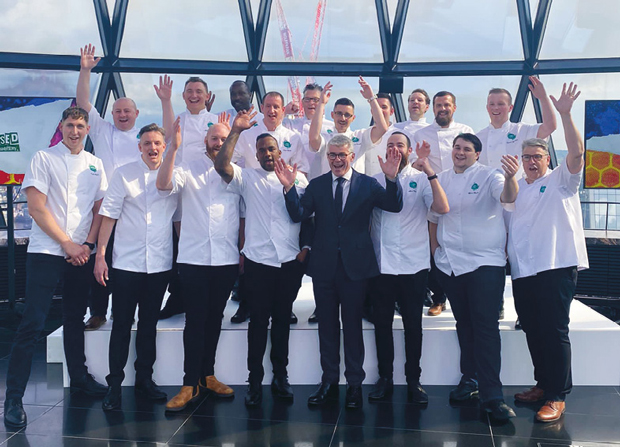Ronan Harte, Chief Executive Officer, BaxterStorey tells FMJ that the hospitable delivery of catering and food services is key to bringing employees back into the workplace
In the September 2022 issue of FMJ we featured a case study on the reimagining of PwC’s ‘deal’ with its 22,000 employees and the role of catering and FM in delivering a revised employee value proposition. The contribution made by BaxterStorey, PwC’s catering provider in delivering the new deal illustrates how a strong catering partnership can support workplace managers in their efforts to engage and enthuse the workforce.
We wanted to delve deeper into how corporate foodservice has reimagined itself over the past few years, so we sat down with Ronan Harte, BaxterStorey’s Chief Executive Officer. He’s been CEO at the firm since 2021, but has worked within the wider WSH Group for over 10 years.
Harte joined the industry as a chef when he was 16, working in various restaurants in Dublin until joining the Cunard line where after several years of building his career he moved into management with P&O cruises, now Carnival. He later set up his own business in food sales to restaurants in Ireland before relocating back to the UK to enter the contract catering market – leading to a variety of roles at parent group WSH before taking up the BaxterStorey CEO role in August 2021.
He describes BaxterStorey, which provides workplace dining across the UK and Ireland, employing more than 5,500 people at over 600 locations, as a fascinating company.
“It’s a very adaptable brand, operating in such different markets, from blue-collar manufacturing to the highest level of white collar in Pall Mall and around the country. I think the private ownership that we have and the tight management within the business without lots of layers is an advantage.
“My philosophy is to keep it simple, move fast on decisions made and because we operate in that way we tend to be very nimble around our customers. The pace is fast, engaging and energetic, so we’re less of an executive brand which to me describes something slower and almost tired, but rather a diverse business that operates across many different markets.”
CATERING CHALLENGES
The last few years have been incredibly challenging for contract catering, assailed by the effects of the lockdown and adjusting to hybrid working patterns – all while facing a recruitment crisis that has hit the sector hard.
“At the beginning of COVID we had that shock everyone went through,” says Harte. “The office environment disappeared and that had an effect on the workforce, which in some cases was decimated. In others though, it was retained very strongly, so by the end of COVID we were in a different place, but the pace of build back over the last 12 months has been thankfully relentless.”
A key advantage he adds is that BaxterStorey’s own Chef Academy, which was set up in 2005 was retained during COVID. It offers the skills, qualifications and recruits to compete in a sector which according to figures from consultancy CGA suggest that one in six (16 per cent) hospitality jobs remain vacant.
Explains Harte: “We’re well known for our training academies and they’ve been hugely beneficial as although we’ve amended some of the curriculum, they were already in place pre-COVID. Our award-winning Chef Academy just clicked back into place so upskilling and developing chefs and apprentice chefs is no problem as we can deliver all of that in-house ourselves.
“The same goes with service. We’ve a brilliant Service Academy that’s been going since 2018, an established Barista Academy and we’ve welcomed 15 new degree apprentices, who have joined us fresh out of school as part of their business degree programme, for the next three years.
“I’m pleased to say that over time we are creating a pipeline of future managers, regional managers and future regional directors. So, with the last of our academies back up and running we’re in good shape and building at all levels, the chefs, front of house managers and senior management of the future.”
HYBRID WORKING
Harte agrees that along with the battle for talent, another big concern for contract caterers is in delivering into a hybrid workforce. While some sectors, such as manufacturing or retail remain much the same the office market has changed, some say irrevocably.
“Maybe it’s a challenge because we were so used to a model that worked, we hadn’t thought about it too much and now we’re in a different place” he argues. “We’ve found though that clients are taking very differing approaches. Some are encouraging their employees to come back three, four or even five days a week.”
In terms of demand, Harte reports that some clients are back to where they were in 2019 and others are trading at the worse end of 20 per cent of 2019 figures. The shape of the week tends to be the Tuesday, Wednesday, Thursday model, with Friday (as with pre-COVID) the least busy. Interestingly he says: “The battle is for Mondays and the question is will it come back over time? We measure footfall every week and found that sales most recently for Monday were the strongest since 2019.
“Food and coffee are being used as a tool to attract people back in, and with the cost of living crisis being as it is, particularly for younger employees we’ve a food offer which can either be delivered free of charge or supported financially. It’s a
great incentive, and for employers it’s a central part of trying to attract their employees back in at a time of high inflation, high cost and of course high wage costs.
“From an employer viewpoint, giving food and coffee away free of charge or at least discounted as a subsidy is a very low-cost way of delivering benefits to your employees, compared to what you might have to do on wage movement in the terms of pay scales. You’ve also got the reassurance that you know your employees are eating well in the workplace.”
Harte argues that from supplying decent coffee to ensuring that the menu offers variety and value for money, it’s ultimately about delivering a personal touch.
“All of our locations regardless of where they are, will be very aware of the make-up of the employee on site; the age group, the affordable spend, and we make sure there is something for everybody in terms of value for money.
“It’s about the feeling the customer has when they come into the dining room or the coffee shop that makes all the difference. The coffee can be great but we want the extra 20 per cent which is the personal touch, and that extra in my opinion is what we do really well. That extra is the difference between buying coffee from a high street retailer who doesn’t know you, to someone who recognises you, knows your name and maybe knows you like a Danish pastry on a Thursday as a treat.”






